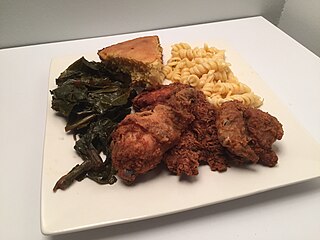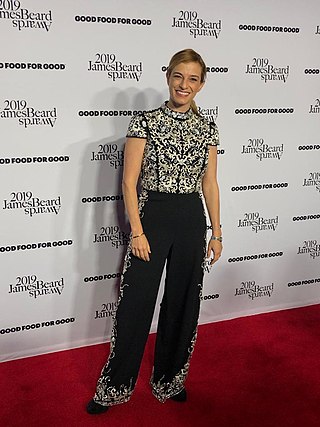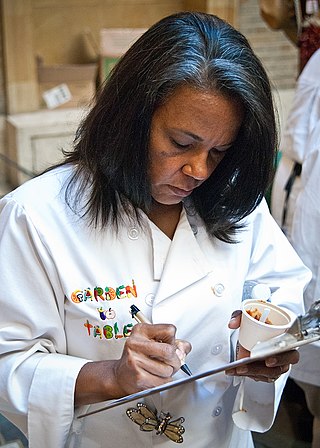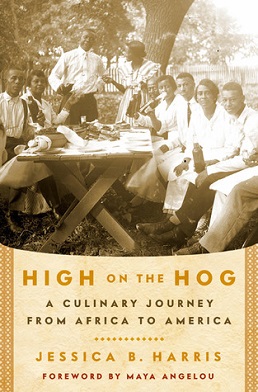Related Research Articles

Soul food is the ethnic cuisine of African Americans. Originating in the American South from the cuisines of African slaves transported to the Thirteen Colonies during the colonial history of the United States, soul food is closely associated with the cuisine of the Southern United States. The expression "soul food" originated in the mid-1960s when "soul" was a common word used to describe African-American culture. Soul food uses cooking techniques and ingredients from West African, Central African, Western European, and Indigenous cuisine of the Americas.

The cuisine of California reflects the diverse culture of California and is influenced largely by European American, Hispanic American, East Asian and Oceanian influences, and Western European influences, as well as the food trends and traditions of larger American cuisine.
Sara Moulton is an American cookbook author and television personality. In an article for The New York Times, Kim Severson described Moulton as "one of the nation’s most enduring recipe writers and cooking teachers...and a dean of food television and magazines".

The James Beard Foundation is an American non-profit culinary arts organization based in New York City. It was named after James Beard, a food writer, teacher, and cookbook author. Its programs include guest-chef dinners to scholarships for aspiring culinary students, educational conferences, and industry awards. In the spirit of James Beard's legacy, the foundation creates programs that help educate people about American cuisine, and supports and promotes the chefs and other industry professionals.

Ruth Reichl is an American chef, food writer and editor. In addition to two decades as a food critic, mainly spent at the Los Angeles Times and The New York Times, Reichl has also written cookbooks, memoirs and a novel, and has been co-producer of PBS's Gourmet's Diary of a Foodie, culinary editor for the Modern Library, host of PBS's Gourmet's Adventures With Ruth, and editor-in-chief of Gourmet magazine. She has won six James Beard Foundation Awards.

Kim Marie Severson is a reporter for The New York Times. She won a Pulitzer Prize for public service in 2018 as part of The New York Times coverage of sexual harassment and abuse and is a four-time James Beard award–winner for food writing. Severson has published multiple cookbooks and a cooking themed memoir.

Jessica B. Harris is an American culinary historian, college professor, cookbook author and journalist. She is professor emerita at Queens College, City University of New York, where she taught for 50 years, and is also the author of 15 books, including cookbooks, non-fiction food writing and memoir. She has twice won James Beard Foundation Awards, including for Lifetime Achievement in 2020, and her book High on the Hog was adapted in 2021 as a four-part Netflix series by the same name.

Patricia Jinich is a Mexican chef, TV personality, cookbook author, educator, and food writer. She is best known for her James Beard Award-winning and Emmy-nominated public television series Pati's Mexican Table and her James Beard Award-winning PBS primetime docuseries La Frontera with Pati Jinich. Her first cookbook, also titled Pati's Mexican Table, was published in March 2013, her second cookbook, Mexican Today, was published in April 2016, and her third cookbook, Treasures of the Mexican Table, was published in November 2021.
Malinda Russell was a free African-American woman from Tennessee who earned her living as a cook and published the first known cookbook by an African-American woman. The book is historically significant, as it shows that African-American Southern cooking was not solely the domain of poverty cooking, but provides evidence of a sophisticated cosmopolitan skill with complex dishes.
Samin Nosrat is an Iranian-American chef, TV host, food writer and podcaster.
Melissa Clark is an American food writer, cookbook author and New York Times columnist. She is the author of over 40 cookbooks and has received multiple awards from the James Beard Foundation and IACP for her work. Clark has been a regular guest on television series such as Today show, Rachael Ray and Iron Chef America and on radio programmes such as The Splendid Table on NPR and The Leonard Lopate Show on WNYC.
Molly O'Neill was an American food writer, cookbook author, and journalist, perhaps best known for her food column in the New York Times Sunday Magazine and Style section throughout the 1990s.

Sarah Lohman is an American historian, specializing in the history of food. She is the author of Eight Flavors: The Untold Story of American Cuisine.

Toni Tipton-Martin is an African-American food and nutrition journalist and author of several cookbooks, including Jubilee. She serves as the editor-in-chief for Cook's Country. She received the Julia Child Award in 2021, and two James Beard awards.
Stephen A. Satterfield is an African-American food writer, producer, and media entrepreneur. He is the television host of 2021 Netflix docu-series High on the Hog: How African American Cuisine Transformed America.
High on the Hog: How African American Cuisine Transformed America is a television docuseries released on Netflix on May 26, 2021, starring Stephen Satterfield, Gabrielle E.W. Carter and Jessica B. Harris. In August 2021, the series was renewed for a second season.
Gabrielle E. W. Carter is a cultural preservationist, artist, co-founder of Tall Grass Food Box, and creator of Revival Taste Collective. She is one of the main characters on the Netflix documentary series High on the Hog: How African American Cuisine Transformed America that debuted on May 26, 2021. She was also the subject of a short film documentary The Seeds We Keep by the Oxford American.

High on the Hog: A Culinary Journey from Africa to America is a non-fiction book by Jessica B. Harris, published in 2011 by Bloomsbury. The book chronicles the development of African-American cuisine from its origins in African cuisines.

Emily Meggett was an American Geechee-Gullah community leader, chef, and author who co-wrote Gullah Geechee Home Cooking: Recipes from the Matriarch of Edisto Island in 2022. She lived on Edisto Island, near Charleston, South Carolina.
Benjamin "BJ" Dennis IV is an American Gullah Geechee chef and caterer from Charleston, South Carolina who is known for preserving Gullah Geechee cooking and culture. Additionally, he is also notable for his discovery of hill rice in December 2016 in Trinidad, which was thought to have been extinct.
References
- 1 2 3 Hamilton, Kendra (July 20, 2010). "Living by Hand: Leni Sorensen's career path has been anything but conventional". Virginia Living . Retrieved September 23, 2021.
- 1 2 Patterson, Thom (April 18, 2011). "Neither black nor white: Three multiracial generations, one family". CNN . Retrieved September 24, 2021.
- 1 2 3 4 5 6 7 8 Severson, Kim (2021-09-21). "Food Scholar, Folk Singer, Blunt Speaker: The Many Lives of Leni Sorensen". The New York Times. ISSN 0362-4331 . Retrieved 2021-09-23.
- 1 2 "ABOUT ME: Getting to now . . . . ". The View From Indigo House. 2014-01-25. Retrieved 2022-02-01.
- ↑ Severson, Kim (2021-05-17). "The Making of 'High on the Hog,' Bringing Black Food History to TV". The New York Times. ISSN 0362-4331 . Retrieved 2021-09-23.